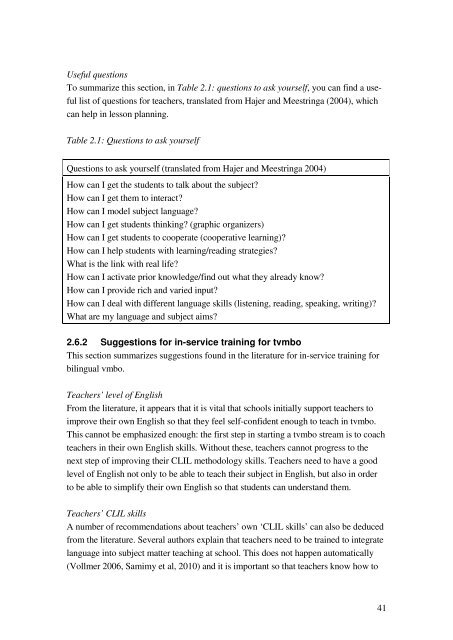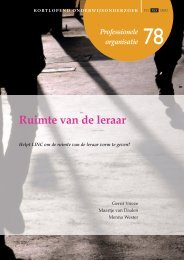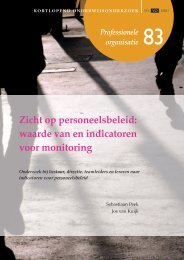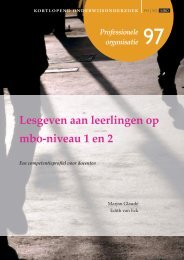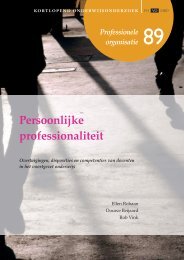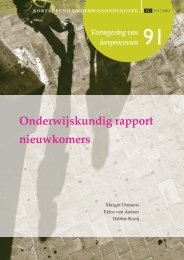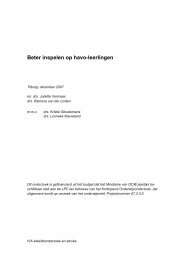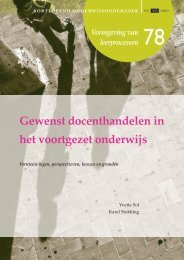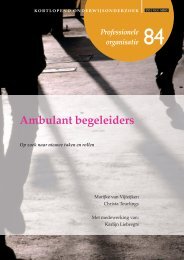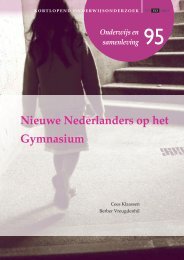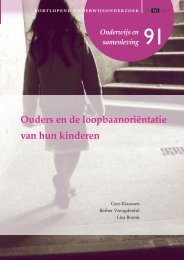Proud to be tvmbo - Kortlopend Onderwijsonderzoek
Proud to be tvmbo - Kortlopend Onderwijsonderzoek
Proud to be tvmbo - Kortlopend Onderwijsonderzoek
Create successful ePaper yourself
Turn your PDF publications into a flip-book with our unique Google optimized e-Paper software.
Useful questions<br />
To summarize this section, in Table 2.1: questions <strong>to</strong> ask yourself, you can find a useful<br />
list of questions for teachers, translated from Hajer and Meestringa (2004), which<br />
can help in lesson planning.<br />
Table 2.1: Questions <strong>to</strong> ask yourself<br />
Questions <strong>to</strong> ask yourself (translated from Hajer and Meestringa 2004)<br />
How can I get the students <strong>to</strong> talk about the subject?<br />
How can I get them <strong>to</strong> interact?<br />
How can I model subject language?<br />
How can I get students thinking? (graphic organizers)<br />
How can I get students <strong>to</strong> cooperate (cooperative learning)?<br />
How can I help students with learning/reading strategies?<br />
What is the link with real life?<br />
How can I activate prior knowledge/find out what they already know?<br />
How can I provide rich and varied input?<br />
How can I deal with different language skills (listening, reading, speaking, writing)?<br />
What are my language and subject aims?<br />
2.6.2 Suggestions for in-service training for <strong>tvmbo</strong><br />
This section summarizes suggestions found in the literature for in-service training for<br />
bilingual vmbo.<br />
Teachers’ level of English<br />
From the literature, it appears that it is vital that schools initially support teachers <strong>to</strong><br />
improve their own English so that they feel self-confident enough <strong>to</strong> teach in <strong>tvmbo</strong>.<br />
This cannot <strong>be</strong> emphasized enough: the first step in starting a <strong>tvmbo</strong> stream is <strong>to</strong> coach<br />
teachers in their own English skills. Without these, teachers cannot progress <strong>to</strong> the<br />
next step of improving their CLIL methodology skills. Teachers need <strong>to</strong> have a good<br />
level of English not only <strong>to</strong> <strong>be</strong> able <strong>to</strong> teach their subject in English, but also in order<br />
<strong>to</strong> <strong>be</strong> able <strong>to</strong> simplify their own English so that students can understand them.<br />
Teachers’ CLIL skills<br />
A num<strong>be</strong>r of recommendations about teachers’ own ‘CLIL skills’ can also <strong>be</strong> deduced<br />
from the literature. Several authors explain that teachers need <strong>to</strong> <strong>be</strong> trained <strong>to</strong> integrate<br />
language in<strong>to</strong> subject matter teaching at school. This does not happen au<strong>to</strong>matically<br />
(Vollmer 2006, Samimy et al, 2010) and it is important so that teachers know how <strong>to</strong><br />
41


